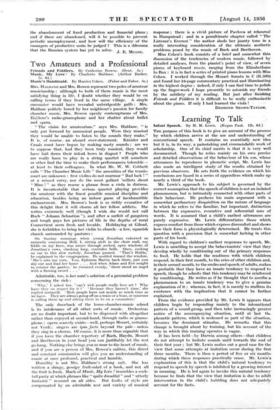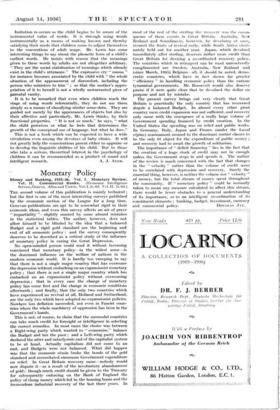Learning To Talk
Infant Speech. By M. M. Lewis. (Kegan Paul. 12s. 6d.) THE purpose of this book is to give an account of the process by which children arrive at the use and understanding of conventional speech. It contains no essentially new idea but it is, in its -way, a painstaking and commendable work of scholarship. One of its chief merits is that it is very well documented. Though he relies mainly on his own precise and detailed observations of the behaviour of his son, Whose utterances he reproduces in phonetic script, Mr. Lewis has also made an intelligent study of the results obtained by previous observers. He sets forth the evidence on which his conclusions are based in a series of appendices which make up nearly a third of the book.
Mr. Lewis's approach to his subject is governed by the correct assumption that the speech of children is not an isolated phenomenon, but is intimately connected with other parts of their behaviour. He prefaces his main argument with a somewhat perfunctory disquisition on the nature of language in which he refers to the familiar, but important, distinction between the expressive, evocative and referential uses of words. It is assumed that a Child's earliest utterances are purely expressive. Mr. Lewis differentiates those which express comfort from those which express discomfort and shows how their form is physiologibilly determined. He treats this question with a precision that is somewhat lacking in other parts of his book.
With regard to children's earliest responses to speech, Mr. Lewis is unwilling to accept the behaviourists' view that they develop wholly by conditioning out of the primary responses to food. He holds that the readiness with which children respond, in their first month,'to the cries of other children and, in their second month, to the smiles and speech of adults, makes it probable that they have an innate tendency to respond to speech, though he admits that this tendency may be reinforced by conditioning. He writes as if he thought that to ascribe a phenomenon to an innate tendency was 'to give a genuine explanation of it ; whereas; in fact, it is merely to reaffirm its existence with the implication that it cannot be further explained. From the evidence provided by Mr. Lewis it appears that children begin by responding mainly to the intonational pattern of a- sound-group, and then take increasingly greater notice of the accompanying situation, until at -kat flio phonetic pattern, which is reckoned as part of the situation, becOmes the dominant stimulus. He remarks that this change is brought about by training, but his account of the
way in which this training operates is vague. ' • ' ' • It has been held—by Darwin among others—that children do not attempt to imitate' sounds" until'towards the end of their first year ; but Mr. Lewis makes out a good case fcir the view that some attempts at imitation occur during the 'first three months. There is then a period of five or six months during which these responses practically cease. Mr.'Lewis's explanation of this is that the child's natural tendency to respond to speech by speech is inhibited by a growing interest in meaning. He is led again to invoke this natural tendency because he finds that the view that imitation is due to adult intervention in the child's babbling does not adequately account for the facts. Imitation re-occurs as the child begins to be aware of the instrumental value of words. It is through using words instrumentally as a means of making known and thereby satisfying their needs that children come to adjust themselves to the conventions of adult usage. Mr. Lewis has some ,interesting things to say about the phonetic form of a child's earliest words. He insists with reason that the meanings given to these words by adults are not altogether arbitrary. They are the social stabilisation of meanings which already ,exist in the child's utterance." The expressive cry mama " • for instance becomes associated by the child with " the whole . situation of the appeasement of discomfort, including the .person who ministers to him " ; so that the mother's appro- priation of it to herself is not a wholly unwarranted piece of parental vanity.
It is to be remarked that even when children reach the stage of using words referentially, they do not use them simply as a means of classifying similar sense-data. They are guided not merely by the appearances of objects but also by their affective and particularly, Mr. Lewis thinks, by their functional properties. " It is not so much," he says, what the .child perceives or what he feels that determines the growth of the conceptual use of language, but what he does."
This is not a book which can be expected to have a wide circulation even among the devotees of baby clinics. It will not greatly help the conscientious parent either to appraise or to develop the linguistic abilities of his child. But to those who take a serious, theoretical interest in the psychology of children it can be recommended as a product of sound and







































 Previous page
Previous page